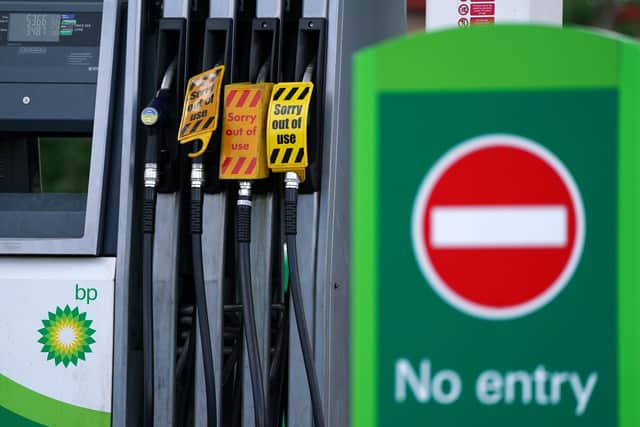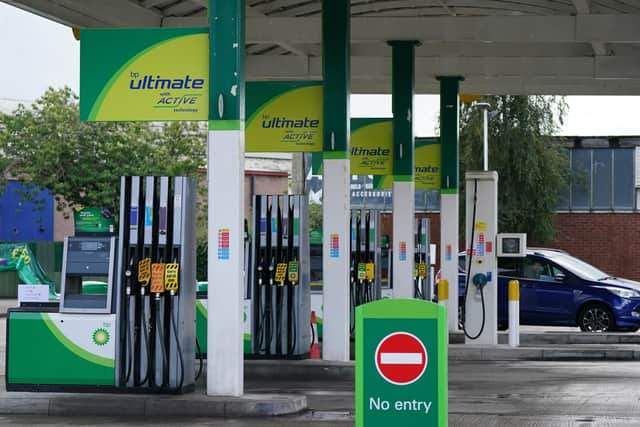How to solve Britain’s energy crisis before lights go out – Bernard Ingham
I have been forecasting trouble with energy supplies for decades thanks to the incredibly stupid energy policies over the past 30 years.
Advertisement
Hide AdAdvertisement
Hide AdNow we have the makings of a perfect winter storm with power supplies jeopardised by our over-reliance on wind and solar power while phasing out coal, oil and gas generation and with a rapidly ageing fleet of nuclear power stations.


On top of this petrol is being rationed in a highly volatile market with a post-Covid shortage of lorry drivers that is also threatening food supplies.
Rocketing gas prices are giving a twist to rising inflation and we are prone to Russian blackmail to the extent that our gas supply comes from that source.
Unlike other European nations, we have next to no gas storage following the closure of the Rough field which acted as our gas bank.
Advertisement
Hide AdAdvertisement
Hide AdTo put the tin hat on it the nation’s finances are deeply in debt – a cool £300bn – severely limiting our room for manoeuvre.


It almost defies belief that a panoply of politicians, policy-makers, engineers and the National Grid could have landed us in this threatening mess.
They have fallen hook, line and sinker for the environmental lobby’s “Project Fear” campaign on climate change.
It is, of course, entirely possible, even if it looks unlikely, that Boris Johnson, a lucky general so far, will get away with it.
Advertisement
Hide AdAdvertisement
Hide AdBut the mess that is energy policy will catch up with us sooner or later.


Pray hard for a mild, windy winter because one event – the UN’s climate change conference (COP26) – in Glasgow in November will almost certainly prevent any possible remedial action before then because of the political capital invested in a success for Britain by Boris Johnson.
Let’s hope that he is not posturing on the world’s stage when the lights go out.
So, what do we need to do?
Quite simply, to go back to first principles which were dinned into me during my five years at the Department of Energy in the 1970s when North Sea oil and gas came on stream just after the NUM put us on a three-day week.


Advertisement
Hide AdAdvertisement
Hide AdThis demands an energy policy that provides security of supply at lowest possible cost – the foundation of any successful economic policy.
I fully accept that this now needs to be upgraded to require those energy supplies to be as clean as possible, too.
How do we get back to first principles?
It would help if we had a Department of Energy instead of this vital issue being buried in an industrial conglomerate of the Government machine.
It is a well-worn joke in Whitehall that we only get an energy department in a crisis, so its time has come again.
But that in itself will solve nothing.
Advertisement
Hide AdAdvertisement
Hide AdIt needs to be headed by the toughest-minded politician and leading civil servant with a simple remit: secure the country’s energy supplies as soon as possible.
That means knowing where the watts and therms are coming from when the wind doesn’t blow and daylight fades.
It will require a slow-down in the phasing out of coal, gas and oil power generation; the resurrection of fracking for oil and gas on land; North Sea development; and building up stocks of gas.
The longer we are less than self-sufficient the more exposed we are to market rigging.
Advertisement
Hide AdAdvertisement
Hide AdNone of this will be accepted by the eco-fanatics or perhaps even be popular when, for example, a new campaign is launched to extend home insulation, especially with rising costs and taxes.
But energy conservation has always been one route towards greater security.
Which brings me to nuclear energy, the cleanest form of power generation.
Here the outlook is grim because we have largely abandoned it as a future major source of power.
Advertisement
Hide AdAdvertisement
Hide AdAll our plants have at least 25 years’ service and only one replacement is being built at Hinkley Point in Somerset.
It is one of three European reactors being built by EDF, the French state-owned company.
The first at Olkiluoto in Finland was started in 2005 and is unlikely to come on stream until next year.
The second at Flammanville in France, started in 2007, is listed for generation in 2023.
Advertisement
Hide AdAdvertisement
Hide AdAt best, it seems that Hinkley Point will take 10 years (to 2026) at enormous and rising cost.
And now we are belatedly exercised about China being involved in our nuclear development.
This is where wet incompetence driven by political correctness gets you.
Support The Yorkshire Post and become a subscriber today. Your subscription will help us to continue to bring quality news to the people of Yorkshire. In return, you’ll see fewer ads on site, get free access to our app and receive exclusive members-only offers. Click here to subscribe.
Comment Guidelines
National World encourages reader discussion on our stories. User feedback, insights and back-and-forth exchanges add a rich layer of context to reporting. Please review our Community Guidelines before commenting.